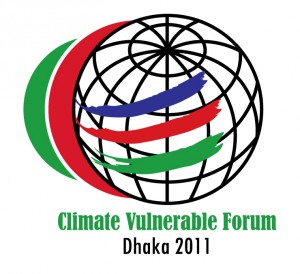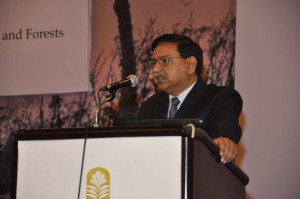November 13, 2011
Speech presented at the Climate Vulnerable Forum 2011 in Dhaka, Bangladesh during the Common Space session
By Saleemul Huq, Senior Fellow, Climate Change, International Institute for Environment and Development in London
 Mr Chairman, Excellencies, Ladies and Gentleman.
Mr Chairman, Excellencies, Ladies and Gentleman.
I would like to thank the organizers of the third Climate Vulnerable Forum meeting in Dhaka in 2011 for inviting me to share some thoughts with you.
It gives me particular pleasure to be here as I was also invited by President Nasheed to address the first meeting of the Forum in the Maldives two years ago.
I will provide you my perspective of how the issue of climate change has evolved from impacts to vulnerability and then to adaptation and now towards transformation based on my over two decades of engagement in both the global science and politics of these issues.
As all of you are no doubt aware the science of climate change at the global level is assessed periodically by the Intergovernmental Panel on Climate Change (IPCC) and the global policy making forum is the United Nations Framework Convention on Climate Change (UNFCCC). The evolution of these two bodies has moved in step quite closely over the last two decades and I will give a very short history of that co-evolution.
The first IPCC assessment report came out in 1990 and alerted the world to the looming future problem of climate change due to emissions of greenhouse gases into the atmosphere. Since this was a global problem it required a global solution and all countries of the world came together in Rio de Janeiro, Brazil in June of 1992 at the Earth Summit to sign the UNFCCC where they all pledged to combat the problem but in a “common but differentiated” manner.The second IPCC report came out in 1995 and found that the concentration of greenhouse gases in the atmosphere were continuing to rise despite the pledges taken to reduce them. This led to Kyoto Protocol being agreed at the third conference of parties of the UNFCCC in Japan in 1997 where the developed countries took on firm targets for reducing their emissions replacing the purely voluntary pledges in the original convention.
The third assessment report of the IPCC came out in 2001 and for first time alerted the world that despite earlier pledges to reduce emissions the concentration continued to rise and that by now a certain amount of climate change had become inevitable and unavoidable. It also said that although all countries would eventually be affected there were three groups of countries, all in the developing world, that would be particularly vulnerable, namely the small island developing states, the least developed countries and the continent of Africa. It also said that in addition to continuing to reduce emissions through mitigation a new strategy of adaptation must also be added to respond to the threat of climate change. This led to the creation of several new funds to support adaptation in the least developed countries and other developing countries at the seventh conference of parties in Marrakech, Morocco in November 2001.
The fourth assessment report of the IPCC came out in 2007, which is also when the IPCC was awarded the Nobel Peace prize together with former Vice President Al Gore of the United States, and it stated that the time window for preventing globally catastrophic impacts of climate change over the next fifty to hundred years was a narrow couple of decades at most and that in the next two to three decades the only option was to adapt to the inevitable and unavoidable impacts over that time scale.
It also made the point about the evolution in thinking about adaptation from the first generation of adaptation thinking being about “adaptation in situ” or in other words assisting people to continue their livelihoods where they are in the face of climatic impacts to the second generation of “planned migration” where we know that people now living in certain parts of the world, such as low lying coasts, low islands and drought prone areas, will simply be unable to continue their livelihoods in those places over the next decade or two, and thus will have to be helped to move in an assisted and planned manner.
This injected a note of urgency in the UNFCCC process and at the thirteenth conference of parties in Bali, Indonesia in December 2007 the Bali Action Plan was adopted which laid down a two-year time table to negotiate the next phase of the stronger mitigation targets and support to adaptation and technology transfer to be completed by the fifteenth conference of parties which was due to be held in December 2009 in Copenhagen, Denmark.
We are all familiar with the failure at Copenhagen despite there being over a hundred heads of state present there no agreement was achieved.
Since then, ambitions from the UNFCCC process have been continuously ratcheted down with the sixteenth conference of parties in Cancun, Mexico last year being considered a success merely because it did not break down like Copenhagen. As we move toward the seventeenth conference of parties in Durban in just two weeks from now, ambitions are again being ratcheted down to lower expectation even lower.
Under these circumstances, a paradigm shift is needed and new leadership must make that paradigm shift. The growing numbers of vulnerable countries that have joined the Climate Vulnerable Forum can be that group that takes leadership at the global level. They will have to do this not by their power or financial might but by their example and moral authority.
Many of the countries represented here have already made path-breaking moves in this direction. To mention just two examples, President Nasheed’s pledge to make the Maldives Carbon Neutral by 2020, even though the country is entirely dependent on imported fossil fuels, and Bangladesh’s development, with its own intellectual and financial resources, of a major long term Climate Change Strategy and Action Plan, and then financing it to the tune of over 300 million US Dollars over the last few years from its own resources.
These are just two examples of what countries that many might consider poor and vulnerable victims of climate change are doing that is way ahead of other more well resourced countries, whether in the rich or developing worlds.
So I will conclude by urging the leaders present at this third CVF Forum meeting to take the next step beyond talking merely about combating climate change through mitigation and adaptation, or even, to use the new buzz words, through “Climate Resilient and Low Carbon Development”, but to move even further through a transformational shift towards a greener, more equitable and more sustainable development pathway over the next decade. This will of course take time, effort and resources, but the first step must begin by asserting the will to make it happen. The rest will follow.
I hope that by the end of tomorrow the leaders of the countries present at the third Climate Vulnerable Forum in Dhaka will show the rest of the countries that they indeed do have that will to lead the world in this endeavor.
Thank you.
See the latest updates from the Climate Vulnerable Forum 2011 in Dhaka

Share this